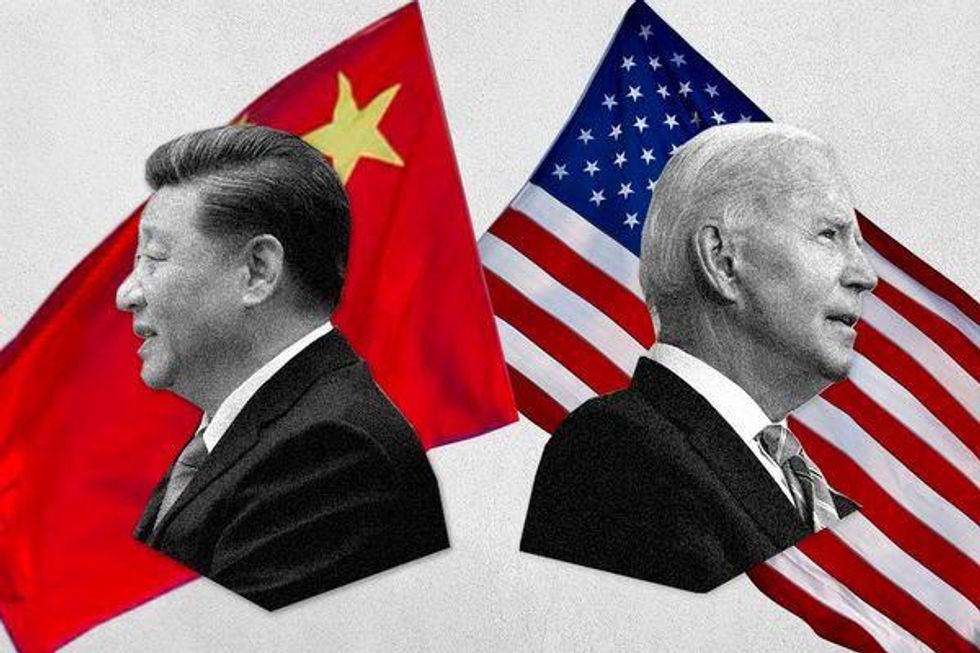Washington announced its “pivot to Asia” 10 years ago, believing that the future of international politics would be defined there. But a perpetual game of whack-a-mole, exemplified most recently in Ukraine, has occupied US foreign policy, making it impossible to “course correct” and counter China’s influence.
Much like Michael Corleone’s efforts to get out of the family business, only to get pulled back in, Washington’s been immersed in its own unsettled affairs rooted in the war on terror (Afghanistan), Donald Trump’s “America First” approach (Iran nuclear negotiations), and the residue of the Cold War (Russia vs Ukraine). These crises have diverted attention and resources away from a China-centric pivot to Asia. However, the war in Ukraine has highlighted America’s need to establish greater leverage over Beijing more than ever.
Step one? Ensuring China’s “no limits” friendship with Russia is, in fact, limited. Sadly, Friday’s meeting between Joe Biden and Xi Jinping – the first contact between the two most powerful men in the world since the war began – didn’t go as well as some suggested. Instead, Biden, who was expected to go in with guns hot amid reports that China was considering a request for military support from Putin “detailed what the implications and consequences would be if China provides material support to Russia,” said White House Press Sec. Jen Psaki.
But no breakthroughs were announced, and while China’s readout said it “stands for peace and opposes war,” it notably did not condemn Putin, and instead referred to abstract Chinese expressions: “He who tied the bell to the tiger must take it off” and “it takes two hands to clap,” suggesting that the US and NATO must deal directly with Russia.
Is Beijing’s deliberate fence-sitting over Russian aggression America’s fault? Washington sees China as its main challenger globally, yet the US has “taken itself off the playing field by receding from its traditional role as writer of rules and setter of standards,” says Evan A. Feigenbaum, vice president for studies at the Carnegie Endowment for International Peace.
Two examples are the main trade agreements covering the Indo-Pacific region, the Comprehensive and Progressive Agreement for Trans-Pacific Partnership and the Regional Comprehensive Economic Partnership. Neither includes India, the sixth-largest economy in the world and obvious “Indo” power, nor the US, the world’s largest economy and a self-declared “Pacific power.” In fact, the US opted out of RCEP negotiations and withdrew from the TPP in 2017.
So Feigenbaum believes Washington “has handicapped its own ‘rebalance’ to Asia by ceding the rule and standard-setting space not necessarily to Beijing but to a broader set of pan-Asian players.”
Those players include South Korea, with the recent return of conservative leadership that’s less deferential to China; the possible end of nuclear-armed Pakistan’s pro-Beijing (and newly pro-Moscow) government; and India, Washington’s beloved Quad partner, but one that is also fence-sitting on Russian aggression. These developments in the Indo-Pacific (and the upcoming Philippine election, which will sway Manila’s China policy) should be grabbing Washington’s attention.
But with a war in Europe, the Biden administration has even less room for leadership in Asia, which means these third parties listed above become even more important. “Because the United States will not have the luxury of simply focusing on China and the Indo-Pacific alone, this will put an even greater premium on coalitional strategies and third players in Asia,” Feigenbaum explains.
Despite the unpredictable challenges of a whack-a-mole foreign policy, the US may already be making progress in the coalition-building department. “It’s impossible to ignore cataclysmic global events,” says Sameer Lalwani, a senior fellow in Asia Strategy at the Stimson Center. “The Biden administration has carefully demonstrated leadership – whether on Afghanistan or Ukraine – while avoiding getting sucked into a new conflict that could distract its focus from China.”
Lalwani believes work is progressing on the Asia pivot. “The Biden administration seems plenty focused on the Indo-Pacific,” he says, “but that’s not going to look like bombastic summitry or Beijing suddenly bending at the knee.” Instead, it’ll be largely invisible but a “steady methodical process of regularly showing up in the region, rebuilding alliances, distributing vaccines, and enhancing and pooling each other's capabilities.”
A year into Biden’s maneuverings in the Indo-Pacific, the record shows some hits and misses. There’s the Quad, a security arrangement between the US, Japan, India and Australia, which shies away from declaring itself an alliance primarily because of India’s concerns for its strategic autonomy. There’s AUKUS, the security pact between Washington, London and Canberra, which has hit a nerve in Beijing, but it's only geared towards building up the Indo-Pacific’s frontlines against China through robust defense and deterrence.
In Ukraine, Washington has proven it can still assume a strong leadership role as needed. It beat the drum about a Russian invasion for months and led a unified allied response, which has led to crippling sanctions and a stronger NATO. “On display in Ukraine is the power of American training, military assistance, and the crushing power of financial sanctions when the US and its European and Asian allies act in lockstep,” says Lalwani. “The techno-democratic coalition the Biden administration has steadily built to implement significant export controls on Russia can now also be deployed for future challenges”
The lessons learned from Ukraine, he believes, “will have benefits far beyond European security.”
There won’t be a perfect moment for it, but the pivot to Asia must prevail. The Middle East will continue to fester. Europe will need help with the fallout from this war. But the largest challenge, China, will prove to be the most pervasive and persistent. Thus, the “strategic” bit of the pivot – public diplomacy, coalition building, defense transfers, trade regimes, technology sharing, military basing — will have to be imagined, calibrated and executed, but only if patience and perseverance is displayed in this and future administrations.






